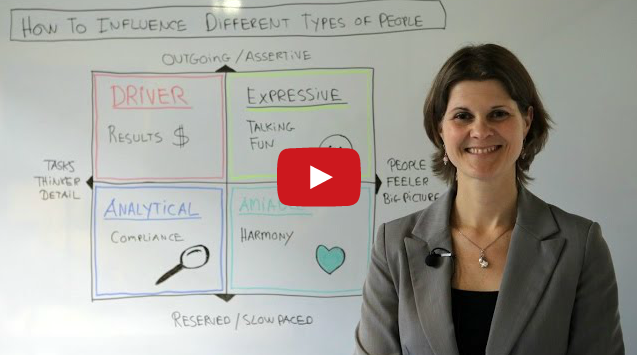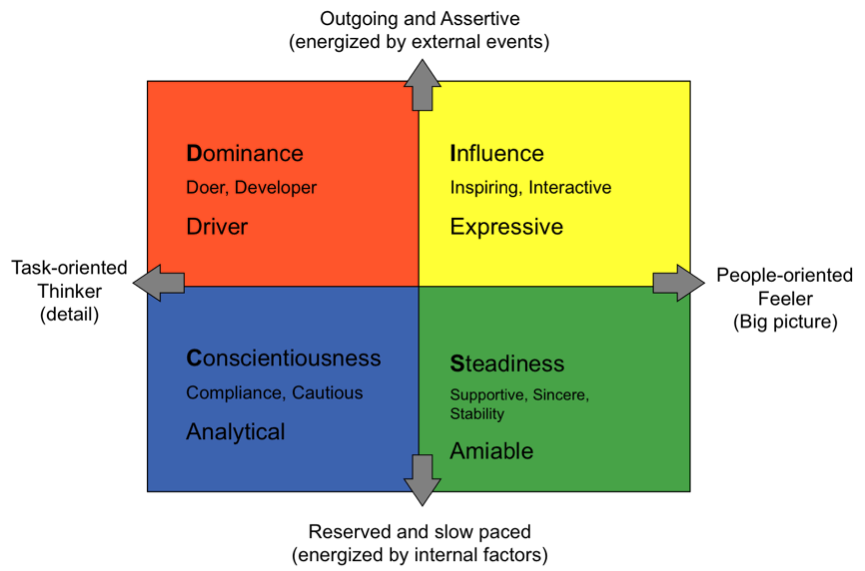DiSC® is based on two basic observations about how people normally behave. The first is that some people are more outgoing and assertive, while others are more reserved and slow paced. The second observation is that some people are more detail and task-oriented, while others are more big-picture and people-oriented. Looking at the matrix below, you will see that this combination creates four different tendencies with the labels Dominance, Influence, Steadiness and Conscientiousness. Everyone exhibits all four tendencies to some extent, but for most people one or two will fit them well whereas one or two other tendencies will seem foreign.
Style I – Influence represents an outgoing, people-oriented individual who loves to interact, socialize and have fun. These are inspiring people who want admiration, attention, respect, and friendship from those around them. We also refer to them as Expressive. They have highly developed people skills and build excellent rapport with their customers. Expressives are typically salespeople, PR representatives, and customer service agents. The key insight in developing a relationship with them is admiration and recognition. By all means, share your experiences, but be sure to give them time to ask questions and to talk. Focus on the positives and avoid overloading them with detail.
Style S – Steadiness represents a reserved, people-oriented individual who enjoys relationships, and who helps and supports others in working together as a team. They are also referred to as Amiable. In most situations they will be reserved but kind, and will happily comply with what they're told. They are mostly concerned with harmony and want people to be happy. Amiables excel at cooperation and dislike telling others what to do. You will usually find them working as receptionists, HR managers, therapists, or in a teaching capacity. When communicating with S-style individuals, be personal and friendly and express your interest in them. Take time to provide clarification, be polite, and avoid being confrontational or rude.
Style C – Conscientiousness represents a reserved, task-oriented individual who is driven by value, consistency and quality information. These types of people focus on being correct and accurate. They are referred to as Analytical as they thrive when working alone on a task that requires accuracy and analytical skills. They are skilled at fixing equipment, keeping track of data, solving puzzles, or finding an efficient solution to a problem. They work best when they are alone in a quiet area, solving a problem or making sure the details are right. Most IT experts, accountants and researchers are Analyticals. When communicating with a C-style individual, focus on facts and details. Be patient and diplomatic and minimize small talk and emotional language.
The first question you need to ask is which personality-style best represents you. Are you predominantly task-oriented or people-oriented? Are you more outgoing or reserved?
The second question is which personality type your main stakeholders are. If you have an Analytical C-style personality for instance you may find it challenging to interface with an executive who is impatient and has a Driver personality, and you may also feel stretched when you speak to an I-style who is very outgoing and talkative - and vide versa.
Good interpersonal relationships arise when we use our emotional intelligence and adapt our style to best suit the person we are interfacing with, irrespective of our own preference. You will need to be more or less assertive, detail-otriented, patient and personal depending on who you speak to.
If you liked this post, you may also like:
How to Wow Your Steering Committee
Rise Above the Most Common Project Management Mistakes
6 principles for building lasting relationships with your stakeholders
20 Essential Tips for Project Leaders










 RSS Feed
RSS Feed